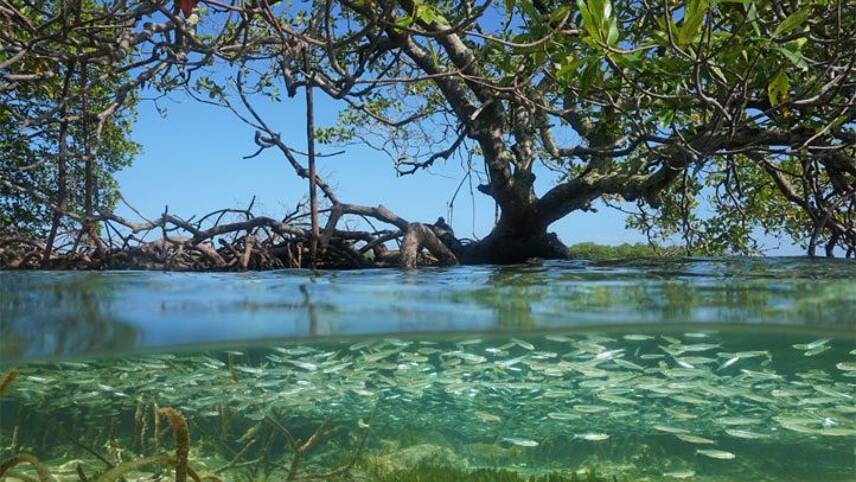Register for free and continue reading
Join our growing army of changemakers and get unlimited access to our premium content

Pictured: A mangrove forest in the Caribbean
The figure is more than a quarter of the UK’s existing commitments within the five-year timeframe, which total £11.6bn. Finance will be provided through bodies including BEIS, Defra and UK Export Finance, which, late last year, confirmed plans to end fossil fuel financing overseas ahead of COP26.
Johnson confirmed the commitment at the virtual One Planet Summit, an event convened by the French government with the aim of getting world leaders to raise their level of ambition for tackling interconnected environmental crises.
“We will not achieve our goals on climate change, sustainable development or preventing pandemics if we fail to take care of the natural world that provides us with the food we eat, the water we drink and the air we breathe,” Johnson told attendees.
To his point on the link between climate change and nature loss, the UN estimates that land and marine habitats could sequester up to a third of the CO2e that needs to be mitigated to meet the Paris Agreement. Yet many ecosystems are being degraded to the point that they will become carbon sources rather than carbon sinks in the coming decades.
As for pandemic prevention, experts have repeatedly warned that the destruction of terrestrial habitats heightens the risk of new zoonotic diseases, as humans are forced into closer contact with wild animals.
Funding from the commitment will go towards the conservation and regeneration of marine habitats, forests and mangroves. Mangroves can sequester more carbon per square foot than traditional forests and could absorb 380 million tonnes of CO2e by 2040 if scaled up.
The Intergovernmental Platform on Biodiversity and Ecosystem Services (IBPES) estimates that extinction rates are currently around 100 times higher due to human activity. Globally, on average, there has been a 68% decline in populations of mammals, birds, reptiles, fish and amphibians.
A tipping point for nature
The announcement from the Prime Minister’s office comes shortly after Global Canopy published new research warning that the funding gap for conserving and restoring biodiversity at the level needed to prevent the Earth’s sixth mass extinction is likely to reach up to $824bn by 2030 in a business-as-usual scenario.
The UK Government has placed more of a focus on nature in recent years, in recognition of accelerating biodiversity loss on domestic and global scales. The 2019 Budget saw then-Chancellor Philip Hammond kick-starting the Treasury’s ongoing review into the economic benefits of conserving and restoring natural habitats. Civil servants at the department are using their findings to inform a framework for nature-related financial disclosures, which will help businesses to predict and prevent nature-related risks. The 2020 Budget, delivered by Rishi Sunak, built on Hammond’s work by earmarking up to £5m for local authorities developing Local Nature Recovery Strategies.
Elsewhere, the Agriculture Bill includes measures to financially reward land manager and farmers for generating net-positive outcomes, while the revamped Environment Bill will introduce legally binding targets for nature by 2022. Johnson has signalled his support for a commitment to protect 30% of habitats nationally, ahead of the UN’s ‘Paris-style’ deal for nature which will likely be headlined by this requirement.
But, like all nations, the UK has failed to meet its Aichi biodiversity targets for 2011-2020. Green groups have pointed to historic issues with degradation on land classified as protected.
Sarah George


Please login or Register to leave a comment.